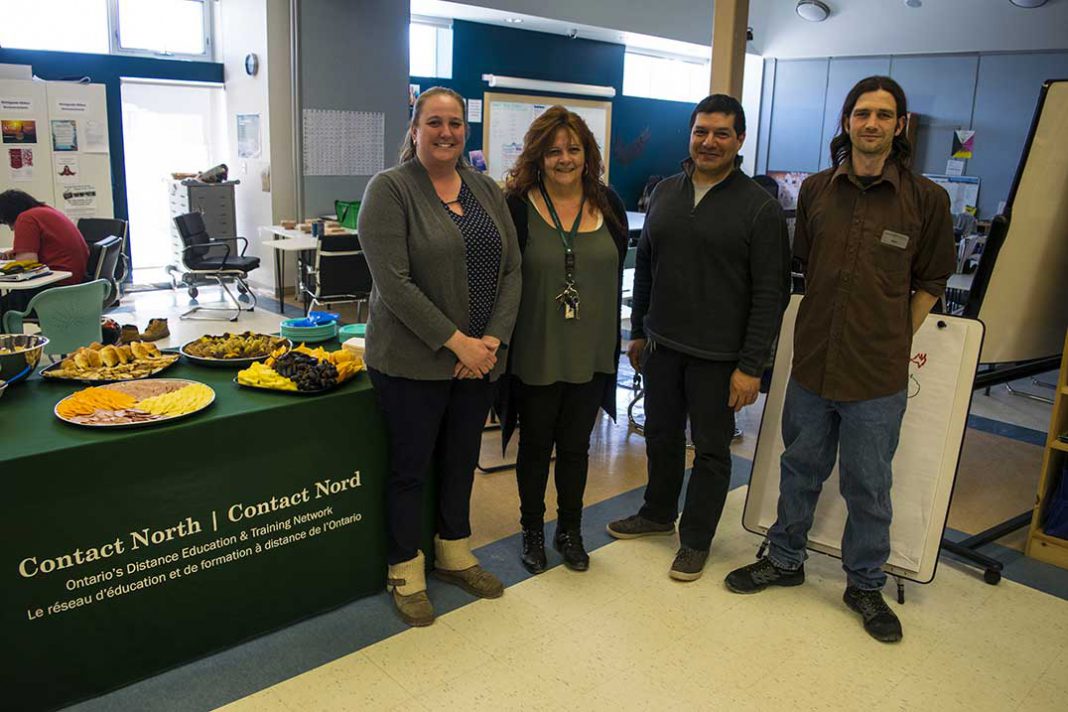M’CHIGEENG—Contact North hosted an open house at its main Manitoulin Island centre at Kenjgewin Teg in late March.
“We’re Ontario’s online learning network and we partner with 24 colleges, 22 universities, nine Indigenous institutes and 76 district school boards,” said Gail Cook, online learning recruitment officer at Contact North. The school also partners with more than 200 literacy and basic skills training providers and 50 skills development providers.
Contact North allows Ontarians to obtain degrees, diplomas, certificates or upgrade their skills online without having to leave their communities. There are 116 online learning centres across Ontario, including Gore Bay, Wiikwemkoong and M’Chigeeng.
“As the new generations come into the education system, digital technology becomes more prominent,” said Ms. Cook. The students using Contact North’s services can learn on a mobile app or through a traditional computer. But Ms. Cook said the services go far beyond strictly online programs.
“We promote and encourage education and training on all levels, not just online but locally in their communities, such as here at Kenjgewin Teg,” she said. “M’Chigeeng is lucky to have a school like Kenjgewin Teg here, but there are lots of communities who don’t.”
A key advantage of exploring online learning is the high number of free offerings available.
“Getting a diploma is great, but some people just want to get the knowledge itself to start up a business, for example,” said Ms. Cook. “Free courses serve dual purposes: the students gain skills and they can encourage people to continue into more formal studies if they find they like a certain course.”
Given recent reports on Manitoulin’s labour market and a declining number of available tradespeople, Ms. Cook said the new trade school at Kenjgewin Teg will support improvements in the field.
“Tradespeople on Manitoulin Island have largely been grandfathered into the trade and can’t bring on apprentices. Unless somebody is passing along a family business, if they’re applying for funding to take on an apprentice they usually want to see certifications,” she said.
Contact North’s many free course offerings are also popular among recent high school graduates who are unsure of the direction they should take, or those who have started post-secondary education but are dissatisfied with their program or their school experience.
“We get a big hit in November because people are pressured into things and they’re not happy,” said Ms. Cook. “Those are the people who we suggest try a free course and, if they like it, great. If not, they can drop it easily.”
By exploring a free course, they can see whether a field of study is right for them without having to invest in tuition.
Contact North aims to be as flexible as possible in the services it offers. A student from Wiikwemkoong wanted to study geometrics, a program that other institutions did not offer online. He managed to find all the courses he needed to take across a wide variety of providers and worked with Contact North to piece them together.
Contact North also serves as an exam proctor—its staff is trained to supervise exams. That student was able to take his exam in-house and had all the required courses to obtain his geometrics certification.
Contact North also supports students pursuing a traditional on-campus education by helping students look for funding, whether through their band office, bursaries, grants or scholarships. An estimated $16 million worth of funding goes unused every year. Contact North sets up a calendar of the funding deadlines for which their students would be eligible, and all students have been successful in obtaining some funding according to Ms. Cook. One student from Wiikwemkoong amassed a total of $130,000 in financial support.
Courses at Contact North include basic-level skills training offerings, something Ms. Cook said was important to students who are part of Ontario Works or addictions programs.
“Some of these people can have low self-esteem. The free, short courses can be really good for them because big projects can be intimidating. Once they get done with one small, free course they often go on to bigger and better things,” said Ms. Cook.
Contact North’s e-Channel.ca portal offers preparation for a Graduation Equivalency Diploma (GED), an Academic and Career Entrance (ACE) certificate and pre-testing. Its services are available in French and English and the website is currently being translated into Anishinaabemowin. There are also special provisions for persons who are deaf or hard of hearing.
Many of Contact North’s clients are either trying to raise a family, working full time or have other commitments that make it difficult to attend a traditional school.
“Our training programs can be built around their lifestyle. Our M’Chigeeng centre is open from 9 am to 3 pm but we can support extended hours if needed on evenings and weekends,” said Ms. Cook. “People like the blended environment—they can do their courses at home but if they need to get back and focus they can come into our centre.”
Ms. Cook says her favourite part of Contact North’s structure is that it doesn’t allow excuses.
“We help people get where they want to go, no matter where they’re at,” she said.





